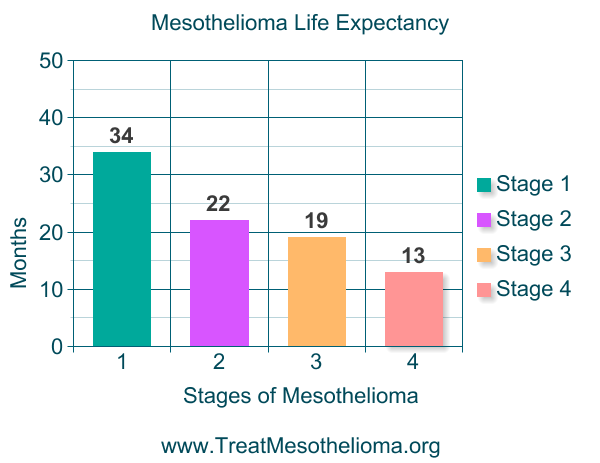Mesothelioma Life Expectancy
Mesothelioma life expectancy is not just a random number that is chosen by doctors on the basis of a few factors. It is a professionally projected measure of time that a patient is expected to live after being diagnosed with the disease. The life expectancy of a mesothelioma patient can be improved by consulting a mesothelioma specialist as well as undergoing several treatment options that have been known to have positive results.
Median mesothelioma life expectancy
The median mesothelioma life expectancy ranges between 12 and 21 months in most cases. This depends on the stage at which a patient is diagnosed with the disease. About 40% of mesothelioma patients live beyond a year while only 20% live beyond two years.

Why is the life expectancy for mesothelioma patients so short?
Malignant mesothelioma is very aggressive. However, its symptoms typically do not show up until the later stages of the disease. This makes the overall mesothelioma life expectancy generally short. Nevertheless, life expectancy rates vary between patients due to a number of individual factors as well as the patient’s current circumstances. Long-term survival with this disease is considered very rare as less than 10% of mesothelioma patients survive beyond the five year mark.
Factors that determine life expectancy
When it comes to determining mesothelioma life expectancy, several factors come into play.
They include:
- Cancer type: There are three main types of mesothelioma. These are pleural, pericardial, and peritoneal cancer. Most mesothelioma patients are diagnosed with pleural mesothelioma. Since it is the most common of the three, more research and funding have been channeled to its study and treatment. A pleural mesothelioma prognosis is considerably more favorable as a result.
- Cancer stage: Mesothelioma is graded or staged on the basis of its severity, from stage 1 to stage 4. The life expectancy of patients whose cancer is diagnosed at stage 1 is generally better. Surgical and other aggressive methods are considered by doctors when it comes to removing the tumors in early stages of mesothelioma. Palliative treatment approaches are mostly used for patients whose cancer is diagnosed at stages 3 and 4.
- Overall health during diagnosis: Chances of fighting mesothelioma are better for patients that are not suffering from other diseases like high blood pressure or diabetes and also for those patients who do not smoke.
- Blood: Recent research has shown that some biomarkers and blood cells have a significant impact on the life expectancy of mesothelioma patients.
- Age: Mesothelioma life expectancy is better in younger, healthier, and stronger patients. This is because their immune systems are stronger and more capable of withstanding grueling treatments.
- Histology: This is also called cell type. It refers to the involved mesothelioma cells. Cells like epithelial cells respond well to mesothelioma treatments. Others like biphasic and sarcomatoid resist most cancer treatments.
How to prolong mesothelioma life expectancy
Although some patients may choose intense treatments that kill the cancerous cells, there are limitations like general health, the cancer stage, and a patient’s age that make these options impossible for others. Chemotherapy, radiation, and surgery are the major treatments used to prolong a mesothelioma patient’s life expectancy. Other options include alternative treatments, getting a second opinion, participating in clinical trials, and employing the use of immune system boosters. Early diagnosis and the ability to undergo aggressive treatment are the two biggest factors in prolonging mesothelioma life expectancy.
